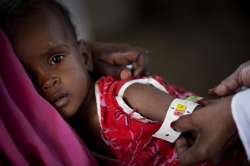India loses 4 per cent of GDP due to malnutrition: Report
India loses about 4 per cent of GDP (gross domestic product) to malnutrition, greater than India's entire defence budget, which is 1.5 per cent of GDP.

India loses about 4 per cent of GDP (gross domestic product) to malnutrition, which is greater than India's entire defence budget, which is 1.5 per cent of GDP.
According to a joint paper published by industry body Assocham and consultancy firm EY, nearly four per cent of the GDP is lost due to different forms of malnutrition and that "women and children deserve a better deal in expenditure outlay".
The report, published on Sunday, says that the trend can be reversed by focusing "on production diversity as well as food fortification at a macro level".
The report outlined that the country hosts 50 per cent of the world's under-nourished children.
The paper quoted data from the National Family Health Survey-4 which showed that close to 60 per cent of children aged between 6 and 59 months are anaemic.
"It is only about 10 per cent of the country's total children who are receiving adequate diet," the research report said.
"The women and girl child, for whom the NDA Government has launched flagship programmes, are no better in terms of their daily nutrition intake. About 55 per cent of non-pregnant women and 58 per cent of pregnant women aged between 15-49 years are anaemic."
Commenting upon the finding, Assocham's Secretary General DS Rawat said the government needs to pursue policies which "focus on removing health and social inequities. Programmes and policies that aim to address the nutrition burden present a double-win situation".
On the remedy-front, the paper said that in order to cater to the large unmet needs of micro-nutrients, "it is imperative to focus on production diversity as well as food fortification at a macro level".
"For instance, millets are three to five times more nutritious than rice and wheat in terms of proteins, minerals and vitamins. They are cost effective crops as well; yet considered as poor people's crop while rice and wheat are preferred over them," the paper noted.
"Millets are rich in Vitamin B, calcium, iron, potassium, magnesium, zinc and are gluten-free. They are suitable for people with gluten allergies or those with high blood sugar levels."
(With inputs from IANS)